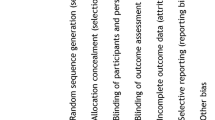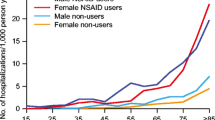Abstract
S(+)-ibuprofen (dexibuprofen) is an NSAID offering a lot of advantages in the treatment of rheumatism and pain. A randomized double-blind, parallel group study in 110 patients showed equivalence in efficacy of 900 mg dexibuprofen (Seractil 300 mg, Gebro Fieberbrunn, Austria) vs. 150 mg diclofenac sodium. Regarding tolerance there was a trend to superiority of dexibuprofen. Therefore dexibuprofen can be characterized as an effective and very tolerable drug against inflammation and pain.
Similar content being viewed by others
References
Shen TY. Nonsteroidal antiinflammatory agents. In: Wolff ME, ed. Burger’s Medical Chemistry. Fourth edn. New York: Wiley & Sons; 1981:1205–61.
Björkman R, Hallman KM, Hedner J, Hedner T, Henning M. Nonsteroidal antiinflammatory drug modulation of behavioral responses to intrathecal N-methyl-D-aspartate, but not to substance P and amino-methyl-isoxazole propionic acid in the rat. J Clin Pharmacol. 1996;36:20–6.
Evans AM. Enantioselective pharmacodynamics and pharmacokinetics of chiral non-steroidal anti-inflammatory drugs. Eur J Pharmacol. 1992;42:237–56.
Evans AM. Pharmacodynamics and pharmacokinetics of the profens: Enantioselectivity, clinical implications, and special reference to S(+)-ibuprofen. J Clin Pharmacol. 1996;36:7–15.
Leising G, Resel R, Stelzer F, Tasch S, Lanziner A, Hantich G. Physical aspects of dexibuprofen and racemic ibuprofen. J Clin Pharmacol. 1996;36:3–6.
Chlud K. Evaluation of tolerance and efficacy of S(+)-ibuprofen (Seractil) in daily practice: A post-marketing-surveillance study in 1400 patients. J Clin Pharmacol. 1995;35:938.
Wechter JW, ed. 1996 symposium on S(+)-ibuprofen: Update. J Clin Pharmacol. 1996;36(12):supplement.
Hawel R, Klein G, Mitterhuber J, Brugger A. Doppelblinde Studie zum Vergleich der Wirksamkeit und Verträglichkeit von 900 mg Dexibuprofen und 150 mg Diclofenac-Natrium bei Patienten mit schmerzhafter Gonarthrose. Wien Klin Wschr. 1997;109(2):53–9.
Klein G, Hawel R, Wallner H, Kullich W. NSAR-Therapie: Schließt Wirksamkeit Verträglichkeit aus? Klinische Erfahrungen mit dem neuen Antirheumatikum Dexibuprofen. D Prakt Arzt. 1994;48:307–13.
Kullich W, Wallner H, Klein G. Die Bestimmung von Serumpepsinogen I und II zur Beurteilung der gastroduodenalen Verträglichkeit von S(+)-ibuprofen. Wien Klin Wschr. 1994;106:208–11.
Hosie J, Distel M, Bluhmki E. Meloxicam in osteoarthritis: a 6-month, doubleblind comparison with diclofenac sodium. Br J Rheumatol. 1996;35:39–43.
Author information
Authors and Affiliations
Rights and permissions
About this article
Cite this article
Zohmann, A., Hawel, R., Klein, G. et al. S(+)-ibuprofen (dexibuprofen) — Excellent tolerance has not to be combined with poor clinical efficacy. Inflammopharmacol 6, 75–79 (1998). https://doi.org/10.1007/s10787-998-0008-2
Received:
Accepted:
Issue Date:
DOI: https://doi.org/10.1007/s10787-998-0008-2




